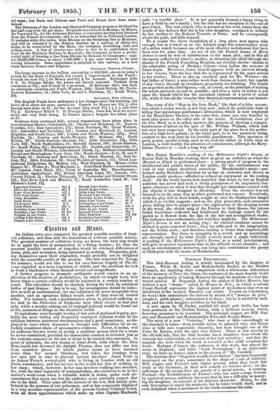PARISIAN THEATRICAIS.
The Anti-Russian feeling is stoutly maintained by the theatres of France. While M. Scribe and Mademoiselle Rachel, at the That.° Francais, are inspiring their compatriots with a wholesome abhorrence of the memory of Peter the Great, the audience of the more humble Guile have an opportunity of hating Muscovy through the medium of a less his- torical symbol. M. Benjamin Antler, the author of Robert Maeaire, has written a new " drame " called Le Masque de .Poix ; in which a certain Count Boriloff represents the highest point of wickedness that even an Inhabitant of the modern Macedon can attain. To gain an inheritance, he would fain exterminate the heiress by means of a "masque de poix," (Anglice, pitch-plaster,) administered in sleep ; but he is misled by dark- ness, and his own daughter perishes by his hand. A new opera by M. Pacini, entitled Gli Arabi nails Gallie, has been been produced at the Theatre Italien, with a brilliant success, which, however, promises to be transient. The principal singers are MM. Gas- sier and Beaucarde and Mademoiselles Bosio and Borghi-Mamo.
The story of a new " Victorine," who rises or falls—accordingly as the standard is taken—from humble Virtue to splendid vice, and thence rises or falls into respectable obscurity, has been brought out at the Porte St. Martin, with the title Jane Osborn. There is this novelty in the oft-told tale, that the frail heroine has a daughter, from whom she conceals her relationship, on account of her bad notoriety ; and that the anguish she feels when the truth is revealed to her child occasions her death. Madame d'Aunet, the authoress of this work, has placed the scene in England ; and while "Lord Nottingham" is an aristocratic roué, we have an honest citizen in the person of " Mr. Cornhill."
The doctrine that " ill-gotten wealth never thrives " has been frequently inculcated on the stage, sometimes in the shape of a tale of diablerie. MM. Angier and Foussier take higher ground, when they teach this
truth at the Gymnase, in their new comedy La Ceinture doree; for the sufferings of the wrong-doer are purely of a moral nature. A cunning Norman—the Yorkshireman of France—who has made a huge fortune• by equivocal means, suddenly discovers that he has a difficulty in marry- ing his daughter, on account of his dubious character. Hence, he not only determines to repair his misdeeds, but he hates wealth itself, and is even delighted when a movement in the funds occasions his ruin.


































 Previous page
Previous page